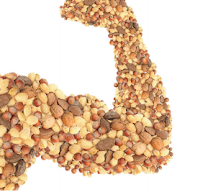Magnesium Myths Magnesium Myths Magnesium Myths Magnesium Myths
Have you ever experienced muscle cramping during or after exercise? This may be the result of a magnesium deficiency.
Magnesium plays a vital role in over 300 metabolic processes, which help supply our body with energy during exercise.
It also allows our bodies to utilise electrolytes, which are a vital component for muscle contraction and hydration.
These days, more and more people are eating processed foods, such as McDonalds (yuck!), while the consumption of whole foods such as nuts and seeds (yum!), which contain high
quantities of magnesium, is sadly decreasing. As a result, people are becoming increasingly deficient in this mineral.There are no obvious symptoms of magnesium deficiency – other than potential cramping – which makes it hard to diagnose.
As knowledge on this issue begins to grow, many theorists are starting to believe that the daily intake for magnesium should be increased.
Three types of foods that may assist in reducing cramps are:
2. Seeds (try eating sunflower, sesame or flax seeds)
3. Whole grains (such as brown rice or whole wheat products)
So whether you’re a daily jogger or an elite
triathlete, if you experience the occasional cramp,
relief may only be a ‘few nuts’ away.
02 fitness 02 fitness 02 fitness 02 fitness 02 fitness 02 fitnes by Brendan McGuiness













Yorumlar
Yorum Gönder